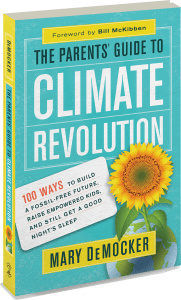Connect with Mary on social media
“Not necessarily,” I countered. It’s true scientists predict that if humans continue spewing carbon at our current rate, temperatures will rise 5-6 degrees by the end of this century, rendering the planet unfit for most life forms. Really bad news. However, they’ve also told us we can (probably) avoid the worst effects of climate change through immediately cleaning up our act–which means no more burning fossil fuels. Scooping out ice cream to our guests, I endorsed 350.org’s proposal for how we might accomplish just that.
Incredulous, one parent nearly choked on the cake. “Divest from oil? Just leave it in the ground?”
“That or kiss Sarah and Justin’s future goodbye,” I replied.
“That’s ridiculous! All manufacturing would end. The world economy would collapse.”
People get a little…edgy. So do I, when I imagine wintry nights without natural gas in my stove. If someone proposed a planetary survival plan that would allow me to keep driving to the southwest for spring break, I’d gladly take it.
No one wants to be told they have an incurable disease. But along with the grim news, they’re usually given two choices:
1) Do nothing. Die or experience diminished quality of life. When and how depends on various circumstances.
2) Act immediately to try to cure, or at least manage, the affliction. Survive, possibly even thrive, though neither is guaranteed. Interventions include surgery, radical diet and lifestyle changes, chemo and/or radiation, and experimentation with new ideas and therapies. This path is painful, disruptive, and involves grief and the relinquishment of cherished habits. It also costs way too much, requiring an overhaul of priorities. After the invasive procedures are done, life-long vigilance is required (bye-bye Marlboros and doughnuts). Benefits may include deeper appreciation for life, loved ones, and blessings previously overlooked.
Important note: This path offers the only viable hope for life and (possible) wholeness.
Similarly, scientists tell us we’ve irrevocably altered Earth’s atmosphere. Done deal. The question is, now what? We —collectively—have two choices:
1) Do nothing . Humanity (and most species) will probably die or experience diminished quality of life. When and how depends on various circumstances.
2) Act immediately to try to solve, or at least manage, the crisis. Survive, possibly even thrive, though neither is guaranteed. Interventions include infrastructure changes, radical global diet and lifestyle changes, social confrontation, and experimentation with new ideas and solutions. This path is painful, disruptive, and involves grief and the relinquishment of tropical getaways. It also costs way too much, requiring an overhaul of humanity’s priorities. After the invasive procedures are done, life-long vigilance is required (endless wars and resource squandering are history). Benefits may include deeper appreciation for life, loved ones, and every cup of clean water.
Important note: This path offers the only viable hope for survival and (possible) wholeness for humanity. It may also offer relief, even joy, as humans recover connections to one another and all life on the planet.
I’m galloping down this second path with everything I’ve got. Please, will you come?


Hi Mary — I loved the article and it was/is a big wake-up call. But I don’t agree with the “come with me or get out of my way” plan of action. It seems hard and I do not agree that we can run over potential allies on our way. One time I heard an oilman say that oil is way too precious to burn as fuel — we need it for plastics and manufacturing. I personally can can walk today because of plastics, and it is the base of much manufacturing and many jobs.
What I would like is a practical discussion of what exactly can I do — in my home, in my lifetime, and in my neighborhood — that would be concrete steps toward a solution. Perhaps ordered in rank of easiest to most difficult, or cheapest to most expensive? What do we do as a family that consumes the most oil (I would add coal as an equal menace)?
As example, we changed out windows to use less heat. We share 1 car — and Sierra uses only public transport. We eat and grow organic. What might be our next step?
I hope this might be a part of your continuing discussion. Much love and admiration, jule
Thanks for your thoughtful reply, Jule. I removed that last line, agreeing with you that it didn’t convey what I meant to, namely that I wished progressives offering only cynicism and defeatism would step aside and not hold activists back with hopelessness. But part of this work is to compassionately meet and redirect despair without getting confused or derailed by it.
Kathy and I discussed exactly the list you describe, and I’ll post that when/if it happens. In the meantime, I do know that while individual efforts are important, the urgency now lies in dramatic overhaul of the political/industrial system. I asked Bill McKibben (father of the US climate change movement) which was more effective in combating global warming–shrinking my family’s carbon footprint or expanding my political activism? His immediate answer: Get political. Change the larger system of destruction. So while I recycle, live in a small house, and support local OG foods, my focus is firmly on advocating fundamental change. I put my love of words and performing to work, trying to, as Barbara Kingsolver says, find that intersection between my passion “and the world’s great need.” Anything that can do that is a great choice.
With much love and admiration right back at you,
Mary